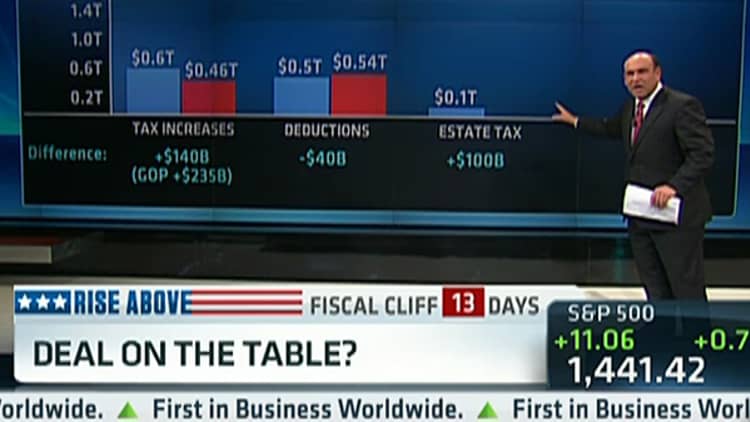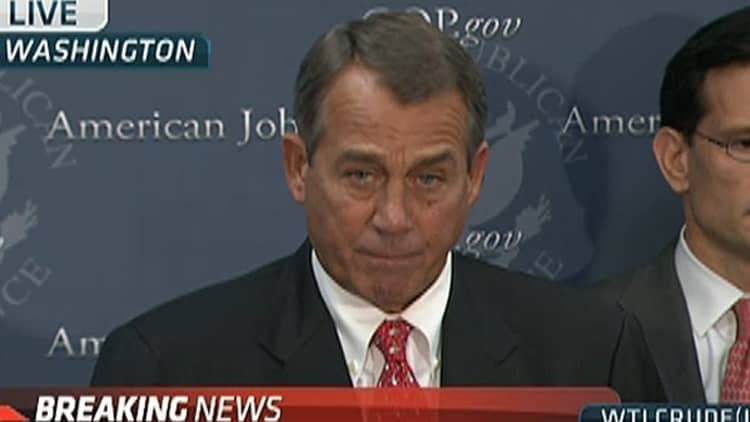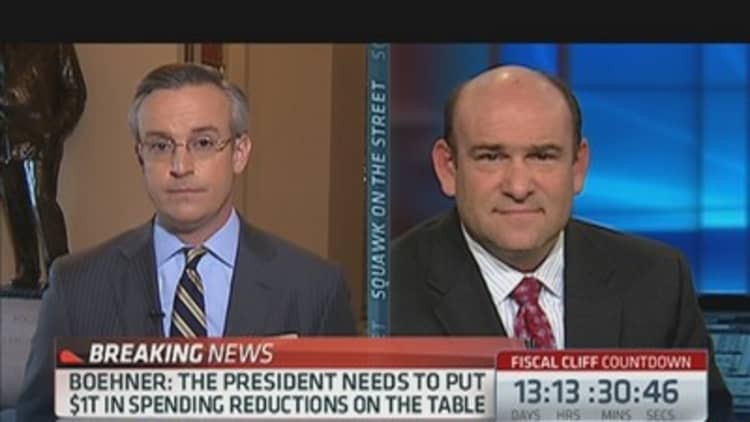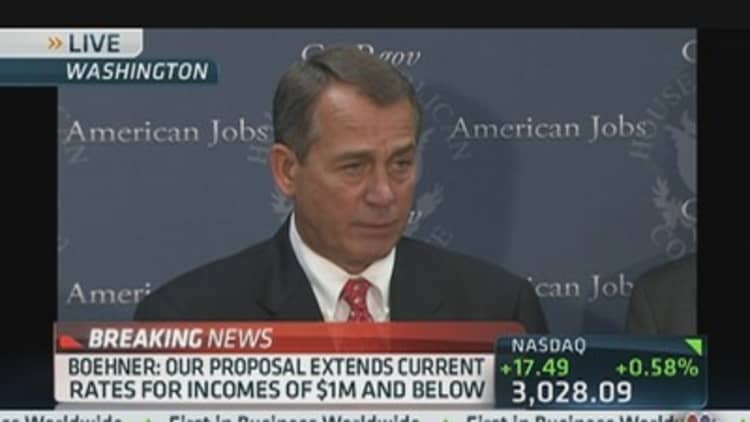President Barack Obama and House Speaker John Boehner pressed ahead Tuesday on trying to avert the "fiscal cliff" after the White House rejected a narrow GOP plan on taxes.
The alternative plan, announced by Boehner, proposed extending the Bush tax cuts for those making up to $1 million while the two sides negotiated the other issues. But the White House quickly rejected it, saying it didn't go far enough and wouldn't pass the Senate anyway.
Boehner said he still hoped to reach a "balanced" agreement with the administration on the fiscal cliff. But he offered a "Plan B" on taxes in case a broader agreement couldn't be reached before the end-of-year deadline in two weeks.
"I believe it's important to protect as many American tax payers as we can," Boehner told reporters.
Senate Majority Leader Harry Reid said the proposal wouldn't pass the Democratic-run Senate, although it is essentially the same plan that House Minority Leader Nancy Pelosi recommended last May. Pelosi also has rejected Boehner's "Plan B" proposal. Reid said by proposing the new plan, Republicans were "walking away" from serious negotiations.
"Now is the time to show leadership, not kick the can down the road," Reid said. "Speaker Boehner should focus his energy on forging a large-scale deficit reduction agreement. It would be a shame if Republicans abandoned productive negotiations due to pressure from the tea party, as they have time and again."
The White House, which on Monday offered to extend the tax cuts for people making up to $400,000 from its earlier $200,000 for individuals, said Boehner's plan didn't put enough tax burden on the wealthiest Americans.

"He (President Barack Obama) is not willing to accept a deal that doesn't ask enough of the very wealthiest in taxes and instead shifts the burden to the middle class and seniors," White House spokesman Jay Carney said in a statement. "The president is hopeful that both sides can work out remaining differences and reach a solution so we don't miss the opportunity in front of us today."
Boehner's spokesman said: "The White House's position defies common sense."
"After spending months saying we must ask for more from millionaires and billionaires, how can they reject a plan that does exactly that?" spokesman Brendan Buck said. "By once again moving the goal posts, the president is threatening every American family with higher taxes."
Conservatives and tea partyers also said Plan B was a non-starter and Boehner lacked the votes for passage. "I think it's a terrible idea," said Rep. Raul Labrador, R-Idaho.
(Read More: Fiscal Cliff Plans: How Close Are They?)
Despite the disagreements over Plan B, the two sides were moving closer together on the larger issue of a deal to avert the year-end fiscal cliff, when more than $600 billion in tax increases and spending cuts would automatically go into effect. On Monday, Obama offered a plan for $1.2 trillion in revenue increases and $1.2 trillion in spending reductions over 10 years. The proposal presented Friday by Boehner would raise $1 trillion over a decade.
Wall Street liked the developments. (Read More: Stocks End Higher on 'Cliff' Hopes.)
Boehner presented Plan B to the GOP caucus Tuesday morning. Afterward, he indicated that the talks to resolve the fiscal crisis were continuing.
"I continue to have hope that we can have a broader agreement with the White House," Boehner said.
In addition to allowing a tax increase for million-dollar earners, the Boehner plan would prevent an expansion of the alternative minimum tax that would otherwise hit 28 million middle- and upper-class Americans with an average $3,700 increase on their 2012 tax returns.
The plan also would extend the current maximum 35 percent tax rate on inheritance, exempting the first $5 million. That tax rate is slated to rise to 55 percent on Jan. 1, with only a $1 million exemption.
Under the plan, the automatic, across-the-board spending cuts of $1.09 trillion to domestic and defense programs would go into effect.
Obama and Boehner have each made significant concessions in recent days, signaling a new stage in the negotiations. But Boehner said Tuesday that Obama's latest plan still wasn't balanced.
"We do not have a balanced plan when the president's calling for $1.3 trillion in revenue and only willing to put $850 billion worth of cuts over 10 years," Boehner said. "The president is not there yet."
Treasury Secretary Timothy Geithner spoke with major CEOs, arguing against Plan B. He said the plan would make the U.S. more vulnerable to a credit downgrade.

Boehner informed the president of his "Plan B" option during a phone call Monday night. He said GOP efforts to cull savings from Medicare by increasing the eligibility age from 65 to 67 could wait until next year. That source of savings had been an important demand from Republicans earlier in Boehner's negotiations with the White House.
The fiscal cliff talks are designed to avert the steep tax hikes and across the board spending cuts set to take effect unless a deal is enacted into law before Dec. 31. Enactment would require a buy-in by the full Senate and House on whatever Obama and Boehner present to them. Neither Obama nor Boehner can be certain yet on how much resistance they might meet from their respective rank and file party members.
(Related Story: Despite 'Cliff' Fears, Home Builders Feel Better.)
Though much work remains, the progress contrasted dramatically with previous movement so slow that as recently as Sunday, some Washington insiders saw a 50-50 chance of going over the cliff -- which the Congressional Budget Office says would bring on a new recession.

In rapid developments Monday, the two sides came significantly closer to bridging gaps on critical issues such as tax hikes for the wealthy and cuts in Social Security cost-of-living benefits. Those issues have the potential to cause problems politically for both leaders, as Republicans and Democrats start to study them.
Obama and Boehner made the most headway on extending the reduced tax rates originally enacted in the administration of President George W. Bush. Both have agreed to keep the low rates for everyone but the wealthy, but they still differ on who qualifies as wealthy for tax purposes.
Obama, whose definition has for months been taxpayers above the $250,000 threshold, traveled to $400,000 in his latest offer. Boehner was at $1 million, but could move down to $500,000.
Obama also offered a "fast track" process for major tax and spending reforms in the year ahead. A Republican aide who asked not to be identified said that "conceptually," there was agreement to make permanent changes in the tax code, with some of those changes taking effect at the start of 2013 and others at the beginning of 2014.

A comprehensive cliff-avoiding agreement would immediately substitute new and more targeted spending cuts for the indiscriminate slashing of defense and non-defense programs known as "sequestration."
Possible plans to produce cuts in spending for Medicare and Medicaid, the government health insurance programs for seniors and low income Americans respectively, remain to be discussed.
(Related Story: .)
Boehner and Obama also made headway on the question of the president's ability to avoid constant battles over raising the debt ceiling, which controls the level of borrowing by the government. Boehner is ready to give Obama a year of relative immunity from conservative strife over the debt ceiling, while Obama is pushing for two years.
At his news conference Tuesday, Boehner said the school shooting in Newtown, Conn., has had an effect on the cliff talks. There's a realization that the country does not want to see a protracted political battle in a time of mourning, Boehner said. "It's not time to put Americans through more stress."

